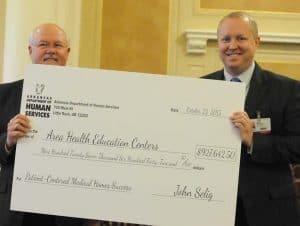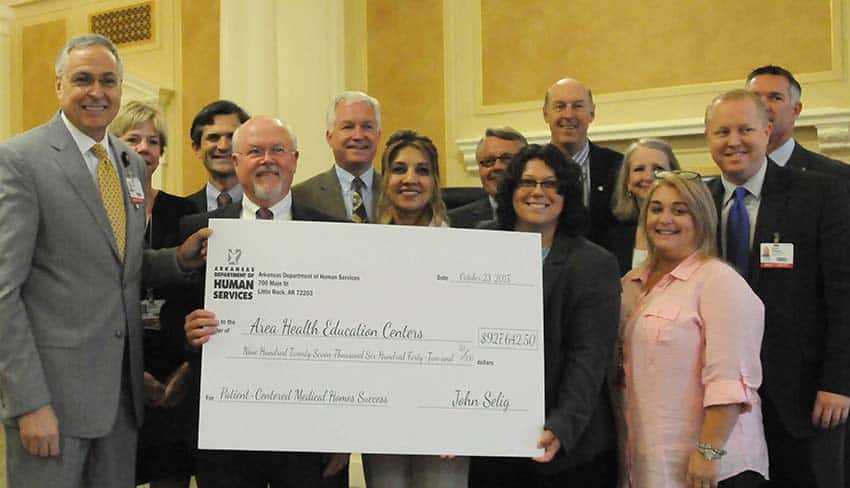UAMS Awarded Nearly $1 Million for Medicaid Savings

Ron Cole, left, director of UAMS Northeast in Jonesboro, and John Vinson, Pharm. D., statewide medical director of Regional Programs, hold the ceremonial check.
| Oct. 23, 2015 | UAMS today demonstrated it is leading the state in improving patient care while also saving money as Chancellor Dan Rahn, M.D., accepted $927,642 from Medicaid for its part in helping Arkansas avoid $34 million in Medicaid costs in 2014.
UAMS received the largest amount of the $5.3 million that Medicaid and the Arkansas Department of Human Services (DHS) shared with 19 Arkansas health care providers.
At the state Capitol, Rahn accepted a ceremonial check from Arkansas Medicaid and praised UAMS Regional Programs and UAMS Regional Centers in Fayetteville, Fort Smith, Jonesboro and Texarkana for achieving the savings.
“We appreciate Medicaid investing in payment redesign to facilitate the transformation,” Rahn said. “We are encouraged by seeing results like better outcomes for the patient, fewer readmissions and emergency room visits and better chronic disease management.”
He said UAMS is redesigning its educational programs to educate all professionals in a team-based model so they are well-equipped to function in this type of environment.
Through its regional centers and the family medical clinics at them, UAMS Regional Programs provides care for more than 18,000 Arkansas Medicaid patients, including children, adults and senior adults.
“The checks being presented today represent a real investment in primary care in Arkansas,” said Arkansas Medicaid Medical Director William Golden, M.D. “That investment has not only resulted in Medicaid controlling costs but also tangible improvements for patients.”
Golden also is a professor of medicine and public health in the Division of General Internal Medicine in the UAMS Department of Internal Medicine.
The primary care providers who received checks are enrolled in the state’s Patient-Centered Medical Home (PCMH) program, which is part of the Arkansas Health Care Payment Improvement Initiative. To qualify for a share of the savings, practices were required to cover at least 5,000 Medicaid beneficiaries alone or by pooling with another practice.
Rather than a physical location, a PCMH is a team-based model of care led by a primary care provider. It promotes preventive care, such as vaccines and wellness checks, while emphasizing the management of chronic conditions such as diabetes and heart disease.
All UAMS family medical centers in 2014 earned national recognition as Level III patient-centered medical homes by the National Committee for Quality Assurance (NCQA).
Statewide in the first year of the Medicaid initiative, there were 659 primary care physicians in 123 PCMH practices enrolled in the program, covering 295,000 Medicaid beneficiaries. Enrolled providers were given a per-member, per-month payment with the expectation that the practice would:
- Better manage patients with chronic conditions
- Provide more intense care for the top 10 percent of patients with complex medical needs
- Meet several quality-of-care and technical metrics
- Provide round-the-clock voice access to clinics and health care professionals
- Coordinate the care of high-risk patients
- Ensure patients get post-hospital stay care
“The patient-centered medical home is not a building, rather it is a wholesale transformation of primary-care practice focused on simultaneously producing better outcomes for patients with measureable quality improvements, better patient experience and lower cost,” Rahn said. “In the past those were seen as in competition with each other, but really they are mutually interdependent.”
Of the 120 practices or groups enrolled in the PCMH program the first year, 37 met the 5,000 Medicaid beneficiaries mark. Nineteen of those clinics or groups additionally met their reporting and quality metrics requirements and were rewarded with shared savings payments in early October in amounts ranging from $8,500 to $927,000.
“The PCMH program has provided UAMS Regional Programs’ clinics with systems, tools, guidance, and incentives to enhance the care of our patients in all applicable medical areas including acute care, chronic disease management and prevention,” said Tim Hill, UAMS vice chancellor for regional programs. “We look forward to working with DHS in the future to expand our PCMH services both in scope and quality.”
